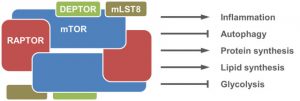Structural Studies of mTOR–DEPTOR Complex of the Ageing-Regulating mTOR Signalling Pathway
Researchers:
Centre for Chemical Biology, USM
Dr. Teh Aik Hong
School of Biological Sciences, USM
Prof. Dr. Mohammed Razip Samian
RIKEN
Dr. Tamao Hisano
Summary:
Ageing is essentially a biological process involving the interactions of many protein complexes and signalling pathways. The mammalian TOR protein, or mTOR, is known to be a key element of a critical signalling pathway — a central pathway that controls many major processes including the process of ageing. Deregulation of this pathway is also linked to human diseases such as cancer, diabetes and neurodegenerative diseases. Interestingly, blocking mTOR’s activity has been reported to extend lifespan in roundworms, fruitflies and mice, and to confer protection against some age-related diseases. One of the mTOR complexes mTORC1 regulates many important pathways for cellular growth.

Roles of the mTOR complex in various cellular biochemical pathways
In 1970, a bacterium was isolated from a soil sample in Easter Island, a Polynesian island famous for its moai statues. The bacterium, Streptomyces hygroscopicus, was found to produce a compound that could kill fungi such as yeast, and the compound was named after the island known locally as Rapa Nui — rapamycin. Subsequently, rapamycin was found to also suppress the immune system, and is nowadays used to prevent rejection in organ transplantation. Three yeast proteins were subsequently identified as the targets of rapamycin, with two of them named literally targets of rapamycin 1 and 2 — TOR1 and TOR2. Shortly afterwards these yeast TOR proteins were also found in mammals, and became the target of intense research in the following years.
The mTOR protein forms two distinct complexes with two sets of proteins, and one of these proteins, DEPTOR, downregulates the complexes’ activity. mTOR, in turn, phosphorylates DEPTOR on multiple sites to promote its release from the complexes. By cracking the mTOR–DEPTOR’s 3D structure using X-ray crystallography, Dr Teh Aik Hong aims to study how DEPTOR turns off these complexes. However, to turn off ageing certainly is not one of the ultimate aims on his mind, at least not at the moment.
